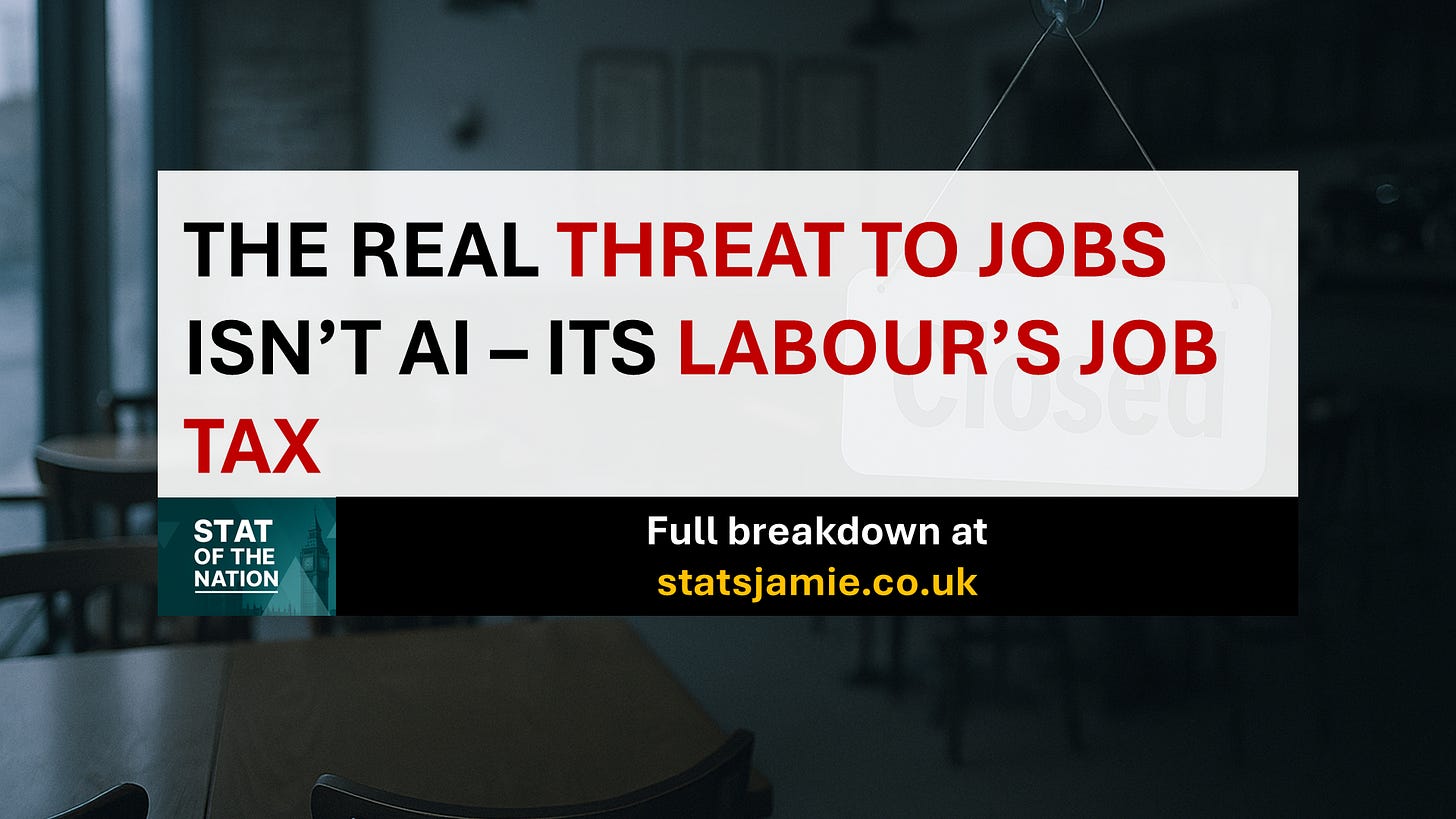The Real Threat to Jobs Isn’t AI — It’s Labour’s Job Tax
ONS data show 143,000 fewer people in work since the election, vacancies at a four-year low, and an economy that’s still stagnant.
Britain’s workforce is being reshaped by technology and squeezed by policy.
Artificial intelligence is changing how some jobs are done and which ones are being advertised — but Labour’s economic decisions are making the overall picture far worse.
As I wrote recently in High Prices, Fewer Jobs, No Growth:
There are now 143,000 fewer people on payrolls since the election.
Vacancies have fallen for 38 consecutive periods.
Employers are holding back on hiring amid higher taxes, rising costs and stagnating growth.
It’s not just the “AI revolution” that’s shaping the future of work — it’s a government that’s choking job creation in the present.
🔻 Vacancies down for the 38th consecutive period
The latest ONS figures show this is the 38th consecutive period where vacancy numbers have dropped compared with the previous three months — a run stretching back more than three years.
Between June and August 2025:
Vacancies fell again to 728,000.
That’s 10,000 down on the quarter and 119,000 lower than a year ago.
This decline began before the election, but it has continued under Labour, with vacancy levels now at their lowest since before the pandemic.
What’s changed since the election is that payroll jobs are now falling too.
Before Labour took office, vacancies were declining but employment was stable.
Since Labour’s victory, both vacancies and payroll employment have been falling together — a clear sign that a hiring freeze has turned into a jobs downturn.
There are now 2.3 unemployed people per vacancy, up from 1.7 a year earlier, as firms pull back across every sector.
🧠 The AI effect is real — but narrow
A new study from King’s College London analysed millions of UK job postings and LinkedIn records between 2021 and 2025, spanning the period before and after the launch of ChatGPT in late 2022.
It found that:
Firms most exposed to AI saw employment fall by around 4.5%.
The biggest losses were in junior office-based roles, down 5.8%, while senior positions were mostly unaffected.
Exposed firms were 16 percentage points less likely to post new vacancies.
The sharpest declines were in technical and creative jobs, while sales roles were the only area to increase.
At the occupation level:
Job postings fell by 23% in AI-exposed fields.
Advertised pay declined by 6% (around £3,000).
Fewer roles required full office attendance, showing a shift towards remote and flexible work.
The overall pattern points to a hiring slowdown, not mass layoffs — firms are simply choosing not to replace staff when roles become vacant.
The author notes some caveats:
The data primarily capture office and professional job postings, rather than the entire economy.
It measures exposure to AI, not confirmed adoption — meaning the effects seen so far are likely an early signal, not the full picture.
That’s slowing recruitment in professional roles — but it doesn’t explain the broader fall in employment across the economy.
💼 Where the real job losses are happening
ONS payroll data show that since Labour came to power, the largest fall in jobs has been in hospitality — down tens of thousands.
These are roles that AI cannot replace:
Bar staff
Waiters
Chefs
Cleaners
What’s hitting them is policy, not technology.
Labour’s jobs tax — higher National Insurance, combined with rising wage costs and business rates — has left many employers cutting hours or closing altogether.
Hospitality is always the first to feel the pinch in a slowdown, but higher costs have turned a fragile sector into a casualty of government policy.
⚖️ Two stories in one
AI is changing what kind of jobs are being advertised — slowing hiring in high-skill office sectors.
Labour’s economic policies are changing how many jobs there are — destroying real ones in hospitality and retail.
Together, they’re squeezing both ends of the jobs market. The rungs of opportunity — from hospitality through to entry-level professional work — are disappearing.
🧩 The takeaway
Britain’s jobs market is being reshaped by technology, but undermined by government policy.
AI may be replacing some office roles, but Labour’s higher taxes and higher costs are costing us real jobs.
The result:
143,000 fewer people are in work since the election.
Vacancies are at their lowest level since before the pandemic.
And an economy that’s still stagnant, not growing.
✍️ Jamie Jenkins
Thanks for reading Stat of the Nation. If you find these stats and insights useful, please share or subscribe to support my analysis.
I crunch the numbers so you don’t have to.
📲 Follow me here for more daily updates:


